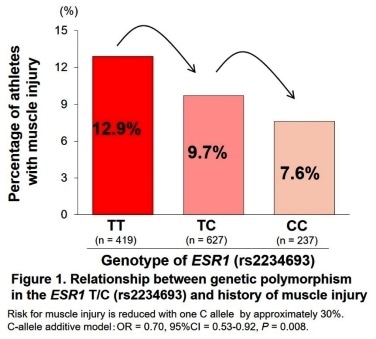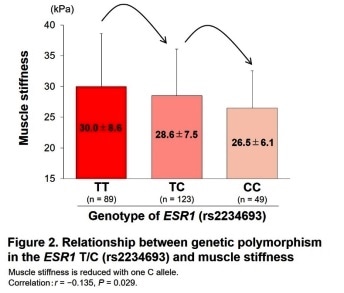Sep 20 2018
To test whether sex-related genetic polymorphisms are associated with muscle injury and stiffness, Noriyuki Fuku from Juntendo University and colleagues report in the journal Medicine & Science in Sports & Exercise that ESR1 rs2234693 polymorphism is associated with both muscle injury and muscle stiffness. These findings suggest a role of estrogen in lowering muscle stiffness by suppressing collagen synthesis, as well as having anti-inflammatory and anti-oxidant effects.

Research on sports injuries.
Preventing injuries in sport is important, and the determination of risk factors, both genetic and environmental, is instrumental to this end. Muscle injury, and in particular hamstring strain, is the most common sports injury, and muscle stiffness is one of the risk factors associated with it.
Because muscle stiffness is more common in men than in women, it is likely that it is determined not only by environmental factors, but also by a sex-related genetic polymorphism, that is, by a variation in a specific gene. The difference in the likeliness of muscle injury in men and women might be related to the presence of sex-related hormones and their receptors, the molecules that bind to them. In particular, there is evidence that estrogen, a female sex hormone, influence muscle stiffness. Therefore, the gene that encodes estrogen target receptors, the estrogen receptor-α gene (ESR1) has two functional polymorphisms (called rs2234693 and rs9340799), which might influence muscle injury due to muscle stiffness.
To test whether these polymorphisms are associated with muscle injury and stiffness, Noriyuki Fuku from Juntendo University and colleagues run two studies, one on top-level athletes and the other on physically active young people, identifying one polymorphism that has a role in determining the likeliness of injury. The findings are published in the journal Medicine & Science in Sports & Exercise. The researchers evaluated, using questionnaires, the muscle injury history of over 1,300 Japanese top-level athletes (many more than in previous studies). They then measured the stiffness of the hamstring muscles of 261 physically active young adults using ultrasounds. For all participants, the polymorphisms under study were analyzed using DNA from samples of saliva.
For the top-level athletes, age, weight and height were roughly the same for athletes who did and did not sustain a muscle injury. In terms of genotype, the polymorphism of rs2234693 was found to be significantly associated with the likeliness of injuries, unlike the polymorphism of rs9340799, which did not show any specific association. For the part of the study involving normally active young people, significant sex-related differences in the stiffness of the hamstring muscle were observed, and also in this case this was associated with the polymorphism of rs2234693. People with the C allele had lower stiffness of the hamstring muscle than people with the T allele. For rs9340799 polymorphism, A/G genotypes showed no influence.

Relationship between a genetic polymorphism in the ESR1 T/C (rs2234693) and history of muscle injury.

Relationship between genetic polymorphism in the ESR1 T/C (rs223493) and muscle stiffness.
The general conclusion is that ESR1 rs2234693 polymorphism is associated with both muscle injury and muscle stiffness. In particular, the C allele is associated with protection against muscle injury and lower muscle stiffness, whereas the T allele is not. The C allele is associated with higher estrogen action, thus these findings seem to point towards a role of estrogen in lowering muscle stiffness by suppressing collagen synthesis, on top of having anti-inflammatory and anti-oxidant effects. The next step will be to investigate muscle stiffness while muscles are contracting rather than resting, the condition under which injury normally happens.